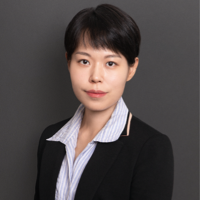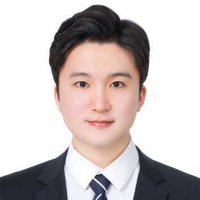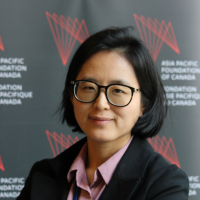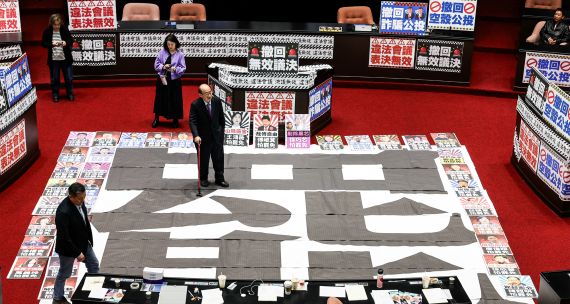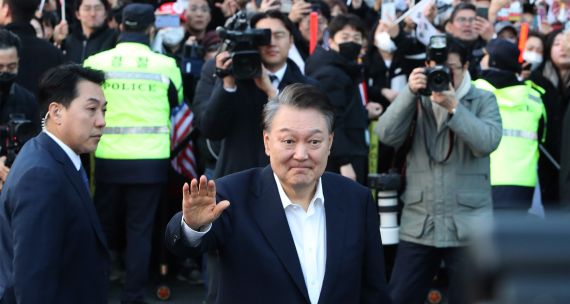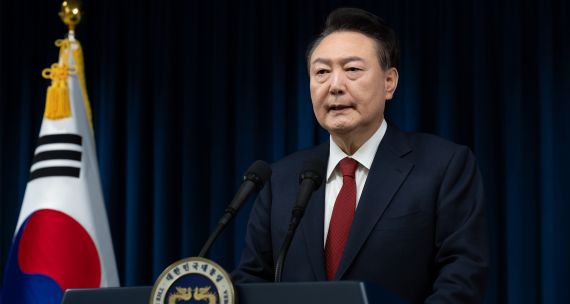South Korea is heading into a snap presidential election on June 3, 2025, after the dramatic December 2024 impeachment of President Yoon Suk Yeol, which was upheld by the country’s top court on April 4, 2025.
This unexpected situation has left both major political camps facing intense internal challenges. The candidate for the conservative People Power Party (PPP), Kim Moon-soo, had a late start to the campaign after the PPP’s bungled attempt to force Kim into negotiating with former prime minister Han Duck-soo, a more prominent and centrist figure than Kim, to create a united conservative ticket. The progressive Democratic Party of Korea (DPK), meanwhile, has rallied around Lee Jae-myung, a front-runner who is entangled in legal troubles.
Below, we explore these two dynamics: the splintered conservative party and the progressive party battling the courts — and why they are crucial for understanding South Korea’s political trajectory.
The main candidates running for president

Lee Jae-myung
A former human rights lawyer and two-term mayor of Seongnam city, Lee first gained national attention during the 2017 DPK presidential primaries. In the 2022 presidential election, Lee was narrowly defeated by Yoon Suk Yeol. He was re-elected in the 2024 general elections and led the DPK to victory, solidifying his role as the main opposition leader and a prominent critic of the Yoon administration.
Lee’s platform centres on a pragmatic foreign policy that adapts to global shifts while striving for sustainable peace on the Korean Peninsula. Lee continues the foreign policy legacy of former progressive president Moon Jae-in, focusing on inter-Korean trust-building, and improving relations with China and Russia. He acknowledges the need to enhance South Korea’s missile defence and strike capabilities while supporting the transfer of wartime operational control, in which the Korean armed forces take back the command of combined U.S.-Korean forces in the event of war. For the progressive party in Korea, the transfer of wartime operational control has long been hailed as a desirable step towards South Korea’s military sovereignty and engaging North Korea, despite the risk of undermining the US-South Korean alliance.

Kim Moon-soo
A former labour activist and two-term governor of Gyeong-gi province, Kim Moon-soo ran in the 2012 PPP presidential primary but lost to Park Geun-hye. Under the Yoon Suk Yeol administration, he was appointed Chair of the Economic, Social and Labor Council and later named labour minister in 2024. Kim gained popularity among conservative voters for his vocal stance against Yoon’s impeachment process and was officially nominated as the PPP’s presidential candidate following Yoon’s removal from office.
Kim’s foreign policy platform is grounded in strengthening the interoperability of the U.S.-South Korea alliance and prioritizing nuclear deterrence against North Korea. He proposes revising the U.S.-Republic of Korea (ROK) Mutual Defense Treaty to include nuclear protection provisions and the rotational deployment of U.S. strategic assets at a level equivalent to permanent stationing on the Korean Peninsula. Unlike Lee, Kim does not prioritize the transfer of wartime operational control, a policy that is seen by conservatives that could lead to U.S. troop withdrawal in Korea – an outcome that can undermine South Korea’s security as the latter currently does not have deterrence against North Korea on its own.

Lee Jun-seok
Lee Jun-seok, a former leader of the PPP who just turned 40 years old (now meeting the minimum age requirement for presidential candidacy), was nominated as its presidential candidate of the conservative New Reform Party. He left the PPP in 2023 after a prolonged faction struggle with pro-Yoon figures and then-President Yoon Suk Yeol during his tenure as party leader. While maintaining a conservative stance, he advocates a more moderate, reform-oriented approach and appeals to younger voters as the youngest candidate in this race.
As a conservative espousing practicality, Lee Jun-seok's platform centres on reforming key branches of government, such as combining the Ministry of Unification with the Ministry of Foreign Affairs to minimize bureaucracy and maximize efficiency. Like Kim, Lee advocates for a strong U.S.-South Korea alliance and has suggested enhancing bilateral defence co-operation with Japan, especially in aerospace technology. Lee has also proposed reopening dialogue with North Korea if elected.
Key events, leadership shuffles leading up to June 3
Since December 3, 2024, when then-president Yoon declared a short-lived martial law, South Korean politics have been thrown into turmoil. In just five months, three acting presidents —Han Duck-soo, Choi Sang-mok, and Lee Ju-ho — have rotated through the top office. The rapid turnover reflects the ongoing political standoff between the ruling PPP and the opposition DPK, which currently controls the legislature as the majority party.
Following Yoon’s impeachment on December 14, Prime Minister Han Duck-soo assumed the role of acting president but was himself impeached two weeks later. The charge from the DPK centred on his vetoing of key bills and delays in appointing judges to the Constitutional Court, an issue at the heart of the ongoing institutional deadlock between the PPP and DPK. His successor, Deputy Prime Minister and Finance Minister Choi Sang-mok, attempted a compromise by appointing only two of three pending nominees, but this move prompted another DPK-led impeachment motion against Choi on March 21. After previous acting president Han Duck-soo was reinstated after his impeachment charges were overturned on March 24, Choi was able to resign on May 1, narrowly avoiding impeachment himself.
Public polarization intensified amid Yoon’s detention and the trials at the Constitutional Court on Yoon’s impeachment, culminating in a riot at the Seoul Western District Court on January 19. Within this increasingly volatile climate, internal divisions within the PPP began to surface. Pro-Yoon loyalists, such as Kim Moon-soo, gained traction as potential presidential candidates, while figures like Han Dong-hoon and Hong Joon-pyo urged the party to maintain neutrality. Both ultimately entered the PPP’s presidential primary.
The Constitutional Court’s unanimous ruling on April 4 to uphold Yoon’s impeachment brought temporary closure to the institutional standoff. In its aftermath, both parties quickly pivoted to their respective primaries. The DPK nominated Lee Jae-myung on April 27, while the PPP selected Kim Moon-soo on May 3 after three primaries. However, Kim’s candidacy was soon undermined by intra-party efforts to replace him with Han Duck-soo, who had resigned in order to enter the presidential race, revealing continued factional struggles. Meanwhile, with back-to-back resignations of acting presidents Han and Choi, Minister of Education and Deputy Prime Minister Lee Ju-ho assumed the acting presidency on May 1, and is tasked with leading the country into the June 3 election.
Key dynamics to watch for in the June election:
1. Conservative infighting reaches climax
The conservative PPP, still reeling from Yoon’s ouster, has been bitterly divided on how to move forward. On May 3, after three rounds of primaries, Kim Moon-soo became the PPP’s presidential nominee. However, he faces stiff public skepticism. Polls show that opposition candidate Lee Jae-myung enjoys a wide lead (approaching 50% support), while Kim trails far behind. Sensing an uphill battle, the PPP’s interim leadership pushed Kim to enter talks with Han Duck-soo in the hope of forming a unified conservative ticket with Han, who is seen by some conservatives as a more palatable figure to mainstream voters.
A seasoned technocrat, Han Duck-soo served as prime minister under the Roh Moo-hyun and Yoon Suk Yeol governments, making him the only South Korean prime minister to have served both parties. Attempts to pick a single candidate — either Kim or Han — ultimately collapsed, prompting party leaders to controversially annul Kim’s primary win and install Han as the candidate in a late-night move. On May 11, Kim was reinstated as the PPP nominee and welcomed the decision, vowing to build a broad conservative coalition now that “everything is back in place.” Han Duck-soo said he “humbly accepts” the party members’ will and hopes for a conservative victory. PPP’s interim leadership expressed regret over the failed unity bid and offered to resign to take responsibility. Kim formally registered his candidacy by the May 11 deadline, giving the conservative bloc its single nominee. However, the week of infighting, after which Kim narrowly regained his nomination, has left lingering fissures within the conservative camp, including the other conservative candidate, Lee Jun-seok, still running on his own with no plans to unite with Kim Moon-soo.
2. Opposition leader faces legal storm
On the progressive side, the DPK has coalesced around its leader, Lee Jae-myung, but is grappling with a different crisis: judicial risks threatening to upend his candidacy. On May 1, the country’s Supreme Court overturned Lee’s acquittal on charges of violating election law and ordered a retrial.
The case centres on allegations that Lee made false statements during a 2022 presidential debate — specifically, denying links to a corruption scandal — which prosecutors say amounted to election law fraud. This ruling effectively found Lee legally culpable, casting a cloud over his eligibility. Apart from the election-law case, Lee is also embroiled in ongoing corruption investigations, including probes into a controversial urban development project from his mayoral tenure, which his opponents cite as evidence of unethical conduct. The DPK has dismissed Lee’s legal turmoil as partisan mudslinging and reacted furiously to the Supreme Court’s move: party officials decried it as a “judiciary coup” and even threatened to impeach the Supreme Court’s chief justice over the decision.
Fortunately for Lee, the retrial and appeals process originally scheduled for May 15 has been postponed to after the election. However, the uncertainty is significant: if Lee is eventually convicted and fined above a certain threshold, he could be barred from office or even stripped of the presidency if elected. The mere prospect of this outcome has motivated the DPK to urgently file a motion to exempt sitting presidents from such legal burdens. This confrontation between the opposition and the judiciary adds another layer of volatility to the race. How these legal issues play out, or escalate, in the final weeks will be crucial: they could either galvanize Lee’s base to rally against perceived injustice or erode enough confidence among undecided voters to alter the election’s outcome.
A long list of ‘to-dos’ after June 3
The unprecedented power vacuum in South Korea’s top leadership has resulted in a series of “Korea passing” moments, with South Korea finding itself sidelined from bilateral meetings with key allies and partners. Former U.S. defence secretary Lloyd Austin and his successor, Pete Hegseth, both skipped South Korea during their visits to Asia in December and March. Japanese Prime Minister Ishiba Shigeru also scrapped his original plans for a January bilateral summit with Yoon.
The leadership vacuum has also stunted Korea’s timely response to several foreign policy challenges in recent months, including the imposition (and subsequent suspension) of 25 per cent tariffs by U.S President Donald Trump, encroachment from China in the Yellow Sea, and North Korea’s formal acknowledgment that it deployed troops to Russia.
With Lee Jae-myung still leading in the polls by a wide margin, all eyes will be on whether and how the PPP can successfully appeal to voters who dislike Lee. Regardless of who wins on June 3, the indelible mark left by the political turmoil of the past six months — deep-seated political polarization, widespread distrust of the legal system, and the desire for long-awaited domestic political reform — could distract the next administration from its goals in reviving a struggling economy and reshaping the country’s foreign policy.
• Edited by Vina Nadjibulla, Vice-President Research & Strategy, and Ted Fraser, Senior Editor, APF Canada. Candidate images: handout.

